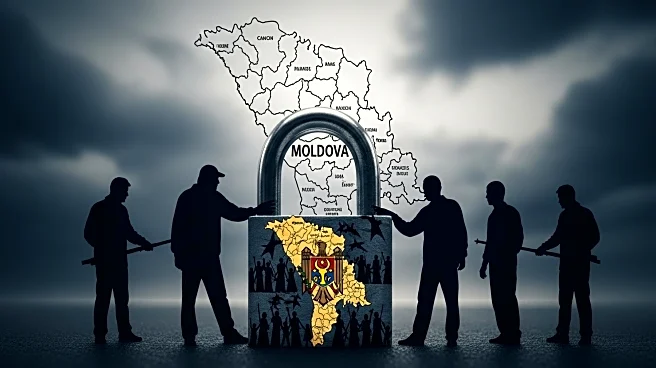What's Happening?
Moldovan authorities have conducted 250 raids and detained 74 individuals in connection with an alleged Russian-backed plan to incite mass riots ahead of the country's parliamentary elections. The raids targeted over 100 people across various localities, with the suspects reportedly receiving training in Serbia. Moldova's chief prosecutor, Victor Furtuna, stated that the plot was coordinated from Russia through criminal elements. The upcoming election is seen as pivotal, with voters choosing between continued EU membership aspirations or closer ties with Russia. The country has been a target of disinformation campaigns aimed at discrediting its pro-European government.
Why It's Important?
The detentions highlight ongoing geopolitical tensions in Eastern Europe, where Moldova's strategic position between Romania and Ukraine makes it a focal point in the EU-Russia dynamic. The alleged plot underscores the Kremlin's use of hybrid warfare tactics to influence political outcomes in neighboring countries. Moldova's path towards EU membership is crucial for its political stability and economic development, but it faces challenges from pro-Russian factions. The situation could impact regional security and the EU's efforts to counter Russian influence in Eastern Europe.
What's Next?
As Moldova approaches its parliamentary elections, the government and international observers will likely increase scrutiny to prevent further destabilization efforts. The Moldovan President Maia Sandu and her Party of Action and Solidarity aim to maintain power and continue the EU integration process. The outcome of the election could shift Moldova's foreign policy direction, affecting its relations with both the EU and Russia. Continued vigilance against disinformation and vote manipulation will be essential to ensure a fair electoral process.
Beyond the Headlines
The situation in Moldova reflects broader challenges in combating disinformation and foreign interference in democratic processes. The use of sophisticated propaganda campaigns, like the Matryoshka operation, highlights the need for enhanced cybersecurity and media literacy to protect democratic institutions. Moldova's experience may serve as a case study for other nations facing similar threats, emphasizing the importance of international cooperation in safeguarding electoral integrity.











